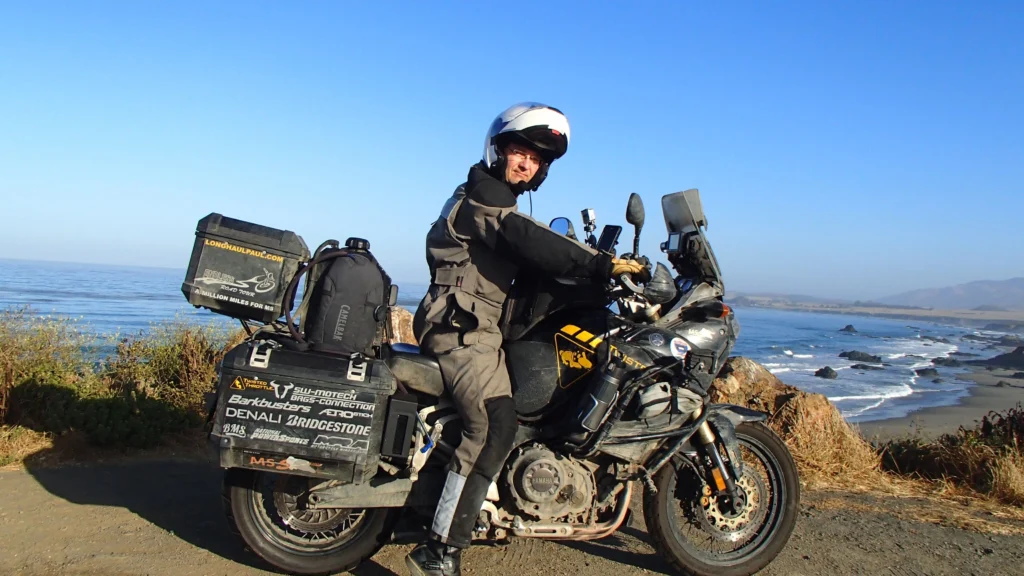
Listen to this Article
The morning air north of Boston carries a crisp bite as Paul Pelland wheels his motorcycle out of the garage. The hills of New Hampshire are still shadowed in early light, but the rumble of the engine cuts the quiet. He straps on his helmet, checks his panniers . . . everything is in its place, as always, and points the front wheel toward another horizon.
For most, a ride at dawn is simple freedom. For Paul, it is also therapy. Diagnosed with multiple sclerosis, a disease that scrambles the nervous system and frays memory, he could have surrendered the road years ago. Instead, he set himself a challenge as bold as the disease is unpredictable: ride one million miles to raise awareness for MS. Nearly 680,000 miles later, the journey is still unfolding one town, one fuel stop, one conversation at a time.
On the bike, Paul feels whole. He calls it “Moto Medicine,” and he means it. Every ride demands attention: balancing through curves, scanning traffic, adjusting throttle and body weight in a rhythm that leaves little room for worry. When heat or fatigue creep in which is a common hurdle with MS, he adjusts his pace, cools down, or pulls over. The act of travel is like treatment for him.
“I joke that if I’m off my bike, I’m off my meds,” he says, and then laughs, the way only someone who has found joy in the face of hardship can.
Paul’s life is charted not in months or years, but in landscapes. Fog draping the rivers of Quebec. The Trans-Canada Highway stretching endlessly westward. Prairie skies where storms gather in plain sight, black and electric against the horizon. Glacial light spilling over the shoulders of the Canadian Rockies.
From his home in New Hampshire, he has traced loops across North America: rolling through Alaska’s rugged peaks, cutting south through Utah’s red canyons, or riding hard across the Midwest plains where ranch gates and fence lines tick by in steady rhythm. Each mile feeds both the mission and the man.
The disease rides with him, but Paul has learned to manage it like another part of the machine. Heat is the fiercest adversary. A small rise in body temperature can scatter his balance and blur his thoughts. To counter it, he rides with cooling vests, breathable gear, even tested a prototype motorcycle air conditioner.
Winter flips the script entirely. When the mercury plunges below zero, Paul doesn’t stop riding. He adapts. He wires himself into the bike like a living circuit, a rolling electric blanket. Heated jacket, pants, gloves, even socks all draw power from the motorcycle’s alternator, turning icy highways into bearable rides. “At minus 18°C, I’m comfortable while I’m moving,” he says. “It’s only when I stop for gas that the cold finds me. The second I unplug, I go from toasty to frozen.”
But gear alone isn’t enough. MS brings memory lapses, so Paul relies on systems. Every item has a home: chargers coiled in one pouch, medication sealed in another, tools nested in the panniers like a pilot’s cockpit. That order is survival. “If I’m tired or my brain is scrambled, I don’t want to be hunting for eyedrops or my hotel key. I know exactly where they are.”
He has built rituals into his travel the way others build muscle memory. By noon, he’s already booked the night’s hotel, long before fatigue fogs his judgment. His saddlebags are mapped with precision. His routine is his safety net. “That’s not just habit,” Paul says with a shrug. “That’s discipline. That’s how I keep rolling.”
Breakdowns happen, but so does kindness. In Ontario, a dealership once cleared its bays at the height of riding season to repair his bike in a single day, refusing payment. In a hotel parking lot, a stranger struck up a chat, disappeared, and came back after Paul had unpacked with an invitation to dinner. They still trade texts years later.
For all the miles, his theft record is laughably small: one stolen granola bar. “Not bad for hundreds of nights in parking lots,” he shrugs.
Paul’s travels offer simple lessons for anyone planning long miles. Invest in a seat that matches your body. Fit handlebars where shoulders rest naturally. Wear a quiet full-face helmet to protect ears and focus. Carry duplicates of critical electronics. Pack tools you actually know how to use. And above all, plan rituals: medications, keys, wallet, chargers, so that tired mistakes never derail the day.
But his bigger message runs deeper. Don’t wait. Don’t postpone joy or passion until tomorrow. MS taught him that risks are constant, but regret weighs more than risk. His talks echo this refrain: if you can’t dance, teach; if you can’t play, coach; if the stage feels far, help backstage. The act of doing still matters.
At day’s end, when the sun dips and the sky turns copper, Paul is often still rolling. The bike hums, the road stretches out, and another handful of miles click into his growing tally. He knows he is lucky, MS doesn’t strike everyone the same way, but he refuses to waste the chance he’s been given.
By now, Paul’s odometer shows more than 680,000 miles, each one a story, a lesson and a reminder that MS may shape his life but will never steer it. The million-mile goal still lies ahead, but the number is less important than the journey itself. Mile after mile, state after state, his ride has become proof that possibility stretches as far as the road does. And with every turn of the wheel, Paul Pelland rolls closer to that millionth mile, carrying with him not just his own hope, but the hope of everyone who sees in his journey a reason to keep moving forward. For Paul Pelland, the cure will never come from a pharmacy shelf. It comes in the form of a motorcycle leaning toward the horizon, carrying him into the next town, the next conversation, the next mile that proves life is still wide open.
Follow Paul Pelland
